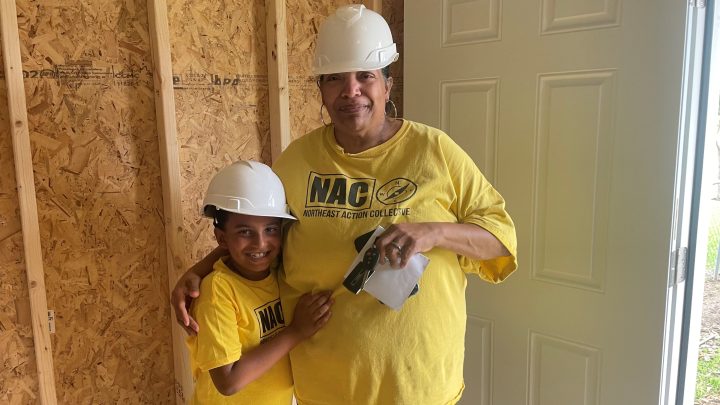
Coastal communities brace for impact as hurricane season begins
Coastal communities brace for impact as hurricane season begins

On a warm Saturday afternoon in early May, hurricane season preparation had been well underway in the Wood Glen neighborhood of northeast Houston, where Regina Broadway Johnson is a longtime community member.
“I love this area,” she said, “I’ve been here now 20 years.” In that time, she’s weathered many natural disasters.
“We’ve been through a few floods, we’ve been through a lot of hurricanes, we’ve been through ice storms,” she said.
Broadway Johnson’s day job is in insurance. She’s also president of her local homeowners’ association and the neighborhood point person when a disaster strikes.
This spring, a local community organization, West Street Recovery, equipped her with a new shed and disaster supplies so that she could better support her neighbors when a natural disaster hits the area.
June kicked off what some scientists predict could be the most active hurricane season on record on the Southeast and Gulf coasts.
With these new resources, Broadway Johnson’s home joins a network of seven community “hub houses” that activate in an emergency. The plan is for all seven to also have solar panels and battery storage by the end of the summer. That will enable the homes to be a source of electricity in their neighborhoods when the power shuts off, which is a common occurrence because of the frequency of intense storms in the Houston area.
And in light of recently awarded federal Solar for All grants, a $7 billion federal investment in residential solar energy in low-income communities, leaders at West Street Recovery are optimistic. They say they are confident the organization can scale up its network of hub houses if it is awarded government funding. While federal funds have been designated for Harris County, where West Street Recovery operates, the recipients of that funding have not yet been decided at a local level.

The success of investments in resilience infrastructure depends on the strength of community networks and their leaders, like Broadway Johnson, who knows her neighbors’ needs well.
“Many have had challenges, either with repairs on their home, [the] constant increase [in] payments,” she said. Many of her neighbors can’t afford home or car insurance, she said.
Insurers across the country have bumped up premiums as they scramble to cover claims amid more climate-related disasters and an increase in construction costs. Some homeowners have lost private coverage altogether.
Broadway Johnson said she herself is feeling the pinch — this summer her home insurance payments could nearly double.
“I’m concerned,” she said, “And I know if I’m concerned and I work, I can only imagine that some of the homeowners that do not work, they may not have insurance. God forbid that we have another disaster.”
Less than a week after Broadway Johnson spoke about disaster preparedness at her hub house, a freak windstorm hit Houston, cutting off power to roughly 1 million residents and businesses.
In northeast Houston, Regina Broadway Johnson hunkered down with her husband and son in their bathroom when the storm hit.
“All of a sudden, the rain is coming down harder, and you hear the hail. And then you hear the winds. And the winds are quick, strong,” she said.
After the storm passed, she went out to survey the damage in the neighborhood.
“This whole community, they don’t have lights. So, you’re talking about 240-plus homeowners,” she said, “No lights. People just [bought] groceries, lost all their food.”
She saw downed power lines and flooded streets. While not a catastrophic storm, like Hurricane Harvey in 2017 or the 2021 Texas freeze, it still took a toll on a community that lives paycheck to paycheck before hurricane season even began.
“Any kind of loss that you have, you’re having to think about ‘What bill do I pay?’ or ‘Am I going to pass that bill to get groceries? Am I going pass that bill to get gas?’” she said.
Broadway Johnson used supplies in her hub house and the West Street Recovery network to deliver fans, power banks and small amounts of money to her neighbors to buy food.
It was exhausting, seeing people in need, she said, especially her elderly neighbors. Many went several days without electricity.
“When it’s all over, you just sit and cry a little bit because you saw the suffering,” she said. “And you wipe the tears off and you get ready for the next one.”
There’s a lot happening in the world. Through it all, Marketplace is here for you.
You rely on Marketplace to break down the world’s events and tell you how it affects you in a fact-based, approachable way. We rely on your financial support to keep making that possible.
Your donation today powers the independent journalism that you rely on. For just $5/month, you can help sustain Marketplace so we can keep reporting on the things that matter to you.











